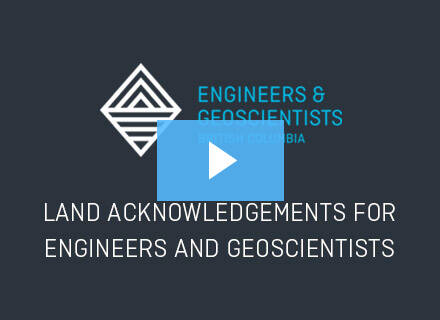In order to influence the culture of engineering workplaces and the relationship between engineers and Indigenous communities, we have focused on providing training on Indigenous histories, residential schools, and reconciliation. In 2019 we partnered with 4 Seasons of Reconciliation Education to provide training for our staff and volunteers. In line with the Truth and Reconciliation Commission’s 94 Calls to Action, Reconciliation Education has created a multi-media learning experience to “promote a renewed relationship between Indigenous Peoples and Canadian Settlers”, available here.
4 Seasons training has been made available by Engineers and Geoscientists British Columbia and can be used for 2.5 hours of continuous education hours of ethical learning by engineers and geoscientists.
In addition, Engineers and Geoscientists British Columbia (EGBC) contracted Nalaine Morin of ArrowBlade Consulting Services to produce a recommendations report on how the engineering profession can appropriately respond to the TRC. The report can be found on the Engineers and Geoscientists BC website here.
Acknowledging First Peoples and traditional land
The intersections and interactions between engineers and Indigenous people often involve the way engineering is understood and practiced, and the challenge of synthesizing Indigenous and Western ways of being. Acknowledging Indigenous land, treaties, and traditional territories is an important protocol that can be a meaningful practice for engineers to incorporate into their workplaces.
Engineers Canada has developed a guide for our staff, volunteers, and others to acknowledge First Peoples and traditional lands when they host meetings, public events, or conferences. The focus of this guide is not to make land acknowledgements a ‘check-box’ exercise, but rather to deeply understand the value land plays to Indigenous peoples and the need to mitigate the erasure of Indigenous communities from Canadian past and present. Although land acknowledgments have become ubiquitous in Canada, there are still many opportunities for us to learn about traditional protocol and the role that land acknowledgements can play on our path towards truth and reconciliation. The guide offers an understanding of the value of land acknowledgements, and tips, templates, and protocols for how to do a land acknowledgement in a personal and meaningful way.
Land Acknowledgements for Engineers and Geoscientists
Engineers Canada and Engineers and Geoscientists British Columbia collaborated on a webinar on ‘Land Acknowledgments for Engineers and Geoscientists’, featuring Chief Leah George-Wilson of the Tsleil-Waututh Nation; Linda Murphy, P.Geo. and member of the Hollow Water First Nation; Matt Dunn, P.Eng., a member of the Athabasca Chipewyan First Nation and former Chair of Engineers Canada’s Indigenous Peoples’ Participation in Engineering Committee;, and Nalaine Morin, a member of the Tahltan Nation.

